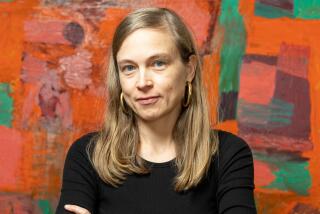MacArthur Fellows 2018: Three writers claim the honor among distinguished group of 25
A Mojave American poet learning the nuanced complexities of her ancestral tongue; a genre-busting fiction writer running an indie press; and an African American novelist who reimagines historical narratives for modern times were among the 25 MacArthur Fellows announced Thursday by the John D. and Catherine T. MacArthur Foundation.
Natalie Diaz, Kelly Link and John Keene join a class of trailblazing fellows working in fields spanning activism, the arts, science, health and more. The honor, which is often referred to as a “Genius” grant, comes with a no-strings-attached award of $625,000, to be paid in installments over the next five years.
According to the foundation, awards are granted to “talented individuals who have shown extraordinary originality and dedication in their creative pursuits and a marked capacity for self-direction.” The decision-making is done by a confidential selection committee of generally about a dozen people. Fellows do not know they have been nominated and are usually stunned speechless when they receive the news a few weeks in advance of the public announcement.
The Times reached out to the winning writers, hoping they had found their voices in time to answer a few questions about the honor. Their answers follow, edited for clarity and space.
Natalie Diaz, poet, Tempe, Ariz.
Diaz’ work melds the personal, political and spiritual to examine the nature of cultural identity and the mechanics of belonging. In her first collection, “When My Brother was an Aztec” (2012), she wrote with wrenching clarity about her brother’s drug addiction, conjuring Mojave, Greek and Christian symbols to describe her family’s painful experience with the disease.
You referred to this honor as “lucky.” What did you mean by that?
In Mojave we say “sumach ‘ahotk. “ It’s often translated as “good luck,: but that’s the least of what it means. It means that there’s something there waiting for you that you have been pointed toward by all of these energies. I was pointed to this when I first became myself — partly through basketball, partly through poetry and party through the linguistic work I’ve been doing with my elders. For me that phrase is how I felt when this happened.
What will the grant money enable you to do?
It’s crazy to even think about that kind of money … but I believe in language, and I believe in the way it connects us. I’m invested in the communal aspect of poetry and art. I have these dreams of inviting the people I know and love into these projects that I’m thinking of, and have been able to do in bits and pieces on my own. I guess I’m thinking less of what I can do and more of what’s possible in my community.
Will the linguistic work with your elders be a part of your plan?
Yes. I work with my teacher Hubert McCord, he’s 97. We have very few speakers left of the [Mojave] language. I’d say anywhere from one to three, and that’s being generous. So I’ve learned so much from Hubert about language loss and also so much about the power of language, and the possibility of language. That really has made poetry more possible for me. I think about language as a body I can hold — sometimes the body of a beloved and sometimes a stranger’s body. I’m a different person since I began this work.
Kelly Link, fiction writer, Northampton, Mass.
Link uniquely melds the mundane and the surreal in her fiction. Fantasy, science fiction and horror play a role in Link’s work, including “The Hortlak,” about 24-hour convenience stores for zombies, and “Stone Animals,” about a troubled married couple who moves to the country only to face a scourge of giant bunnies and haunted household items. Link and her husband run an indie imprint, Small Beer Press, which champions other writers who blend and bend genres in ways that help carve new forms of fiction.
How did you feel when you got the call from the foundation notifying you of the award?
Enormous surprise, and a lingering feeling that it was a crank.
Is money freedom in this case?
Generally, it means freedom to continue to do what I like to do, which is writing. I realize, yes, if the grant had not come through I would also continue to write, but it means that I am not worried over the next couple of years about paying bills. In terms of the work that we do at the press — we are still talking about that. We have no interns in part because we have not felt comfortable not paying people to do work. So now we can get the help we need with publicity, marketing royalties and the rest.
How does your own writing fit into your work with Small Beer Press?
There’s a definite intersection between the kind of writing I want to do and the kind of work we are able to publish at Small Beer, and I feel that those two things refresh each other. Also, because we’ve published some of my collections, those collections have served as an advertisement to other writers who have submitted. The kind of reading I get to do for Small Beer keeps me energized.
How will you celebrate?
We are ordering a couple of pies from Florence Pie Bar and having some friends over to carve pumpkins. (Editor’s note: Link’s favorite pie is strawberry rhubarb.)
John Keene, writer, Newark, N.J.
Keene is a professor in the department of African American and African Studies at Rutgers University. His writing examines historical narratives in a contemporary light in order to contemplate how those stories shaped us, as well as to give agency to suppressed voices throughout the ages. In one such work, “Rivers,” Keene imagines two meetings between a grown Huckleberry Finn and a now-free Jim.
How does this honor feel?
It’s unreal. I was on my way to the post office in downtown Jersey City to mail a bill. I had heard from the foundation that they needed to speak to me. I thought they might want me to comment on a fellow writer. I made the phone call and they said, “Congratulations,” and I think I asked, maybe three or four times, “Is this real?” I don’t think of myself as being a candidate for something like this. I don’t even think of such things.
Since you are not only a candidate, but also a newly minted fellow, what do you think it was about your work that spoke to the committee?
I’d rather leave that to the critics, but here’s one way I think about it: Some of the things that may have stood out to the committee were probably the very same things that led my last big book [“Counternarratives,” 2015] to fly under the critical radar. … It’s a combination of an exploration of history and an aesthetic experimentation, but there’s also a kind of deep critical component woven into the text that may have made it a little baffling to reviewers at first. One of the things that I’ve heard from many readers is that they feel the work rewards rereading, which to me is the highest praise.
What will the grant money allow you to do?
I have not thought about that at all — that’s on the table moving forward. I do teach and I love teaching at Rutgers. I love my students and colleagues and the staff and community there. I do want to keep teaching, but this will provide resources to take time off and continue to focus on my work.
More to Read
Sign up for our Book Club newsletter
Get the latest news, events and more from the Los Angeles Times Book Club, and help us get L.A. reading and talking.
You may occasionally receive promotional content from the Los Angeles Times.







